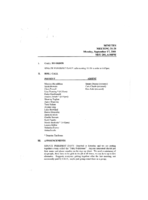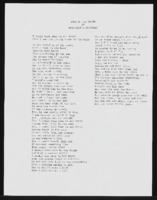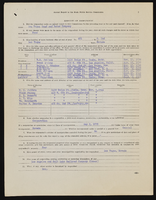Search the Special Collections and Archives Portal
Search Results

Transcript of interview with Vincent Kethen by Claytee White, December 23, 2009
Date
Archival Collection
Description
In 1964, the year that Vincent Kethen was born, desegregation of Las Vegas schools began. Like many African-American children living in the Las Vegas Westside neighborhood, Vincent was bused out of his neighborhood in third grade to attend a white school. In his case, this meant attending John S. Park Elementary and later other predominantly white schools. He talks about these experiences. John S. Park was a neighborhood of manicured lawns, while the school bus and the classroom were places fraught with fisticuffs. The experience of growing up during that era are recalled. Vincent provides a sense of that it was like to reside in his home neighborhood and the onslaught of the drug culture altered gang-lead neighborhoods. Being bused had positive results he explains, such as athletics, which served as an equalizer. For Vincent, a solid upbringing, which included love of church and the chance to attend college, encouraged him to make good decisions about his future. He received a four-year degree and he returned to Las Vegas to "give back." For over a decade and a half, her has coached young basketball players and helped them see their options for a brighter future than they might otherwise have seen.
Text

Interview with Ernest Benjamin Williams, March 26, 2004
Date
Archival Collection
Description
Text
Las Vegas Ambassadors Collection
Identifier
Abstract
The Las Vegas Ambassadors Collection (1968-1985) primarily consists of a scrapbook, newspaper articles, and photographs documenting the activities of the Las Vegas Ambassadors youth singing group. The materials were compiled by Harry LaFavor, the Ambassadors' business manager, who co-founded the group with Norman Kaye and Richie Astone to promote a positive image of Las Vegas. The collection also includes a songbook, vinyl record and ¼” tape recording, and promotional materials.
Archival Collection

Meeting minutes for Consolidated Student Senate, University of Nevada, Las Vegas, September 17, 2001
Date
Archival Collection
Description
Text

Newspaper article, Pioneer Las Vegan Sees Town Grow, Las Vegas Sun, February 9, 1965
Date
Archival Collection
Description
Newspaper article featuring Lucretia Stevens. She moved to Las Vegas in 1923 when the town was about six blocks square and about 60 people made up the black community.
Text

"Home of the Brave": humorous poem by Roosevelt Fitzgerald
Date
Archival Collection
Description
From the Roosevelt Fitzgerald Professional Papers (MS-01082) -- Short stories and poems by Roosevelt Fitzgerald file.
Text

The Boulder Dam Las Vegas Rotary Club newsletter, September 30, 1926
Date
Archival Collection
Description
Text



